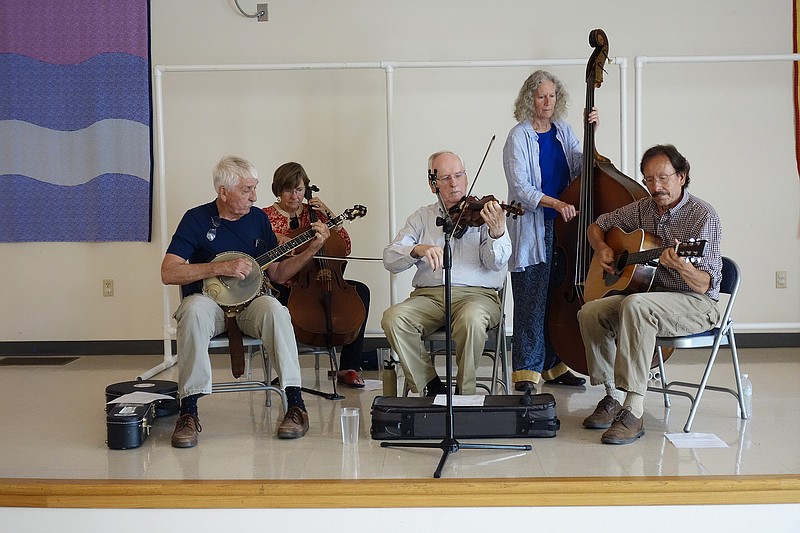Fiddle songs played quick and devilish - that's just the way Howard Marshall likes them.
Promoting a long line of books and his beloved traditional music, Marshall paid a visit to Fulton Sunday, entertaining a crowd at the First Presbyterian Church, an event presented by the Kingdom of Callaway Historical Society.
Under his chin was a shiny fiddle, not expensive originally but now, maybe a century old?
"This is an old, mail order catalog violin," he said. "They shipped hundreds of thousands to the United States in the early 20th century, and most are just firewood. But this is a good one."
Their more famous cousins are rare, indeed, Marshall added.
"There's an old joke," he said. "There were 622 Stradivarius (violins) made, and 918 are right here in Missouri."
Marshall was accompanied by his band mates for the day: Margot McMillen of Callaway County on cello, Bill Foley of Ashland on banjo, Kathy Gordon of Columbia on upright bass, and Henrich Leonhard of Columbia on guitar.
Marshall was introduced by Barb Huddleston, director of the historical society's museum.
"He's the author of 11 books," she said while reading his impressive bio.
Marshall was born in 1944 in Moberly and his family pioneered from Virginia, North Carolina and Kentucky. He dropped out of college to serve in the Marine Corps in the 1960s, then returned to school earning degrees along the way. His PhD in Folklore and Anthropology came from Indiana University - Bloomington. He worked at museums, consulted for the Smithsonian, and established the Missouri Cultural Heritage Center at the University of Missouri, a school where he also taught.
Among his works is "Play Me Something Quick and Devilish." He records and produces fiddle CDs for Voyager Records. His latest book is "Fiddler's Dream," autographed copies of which nearly flew off the table after Sunday's performance.
He and the rest of the performers said they loved sound from the stage at the church.
"This is one of the churches that will allow you to dance in the Fellowship Hall," Marshall said, laughing.
Mostly, Marshall learned to play by watching others - peer learning.
"Yes, I can read anything in the Methodist hymn book, but I learned to play music from other people sitting by them and soaking up what music they provided to us," he said.
Marshall plays mandolin, guitar and banjo, too, and has been known to sing. Since the 1960s he's performed for dances, school programs and festivals. He competes in and judges fiddlers' contests. His grandfather, Wiley Marshall, inspired him to play. Marshall said many musicians were inspired by family members.
The first song played was "Ragtime Annie."
"Every fiddler in Missouri plays this," Marshall said. "If they don't, they can't call themselves a fiddler."
"Turkey in the Straw," based on an old Scottish reel, also provoked toes to tapping. There was a waltz that also started off in Scotland as "Rosebud of Allenvale" that became "Rose of Sharon."
Bill Katon was an African American fiddler from Tebbetts that was part of music's rich history, too.
"He would visit people in South Callaway and play for them," Marshall said before playing a tune he called "Katon's Hornpipe." "We don't know the real name."
Kaden, who died in 1937, sometimes played at an old radio station - WOS - that was established high in Jefferson City's capitol dome where the AM radio waves were the strongest. It lasted 1922 to 1936.
"It was high up so the signal could be heard," Marshall said. "People could hear (music) from as far away as Hawaii, Newfoundland and Cuba. Think about how far away people listened to Bill Katon."
He added he is still searching for information about black musicians so he can document their history.
Marshall is married to McMillen, his cello player on Sunday. She is a Westminster College English professor and author. They live with their border collies on a small farm near Columbia but in Callaway County.

